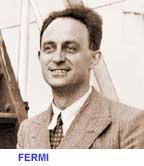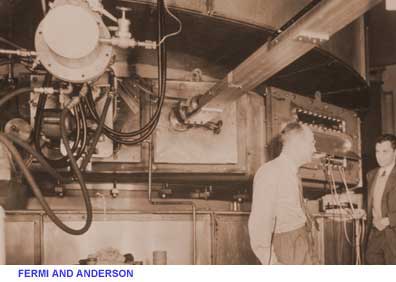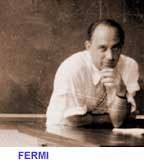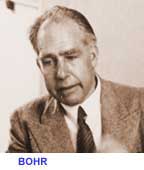 On
the same day that Frisch sent his two scientific papers on fission out for
publication—January 16, 1939—Niels Bohr's ocean liner docked in
New York. Enrico Fermi was on the pier to meet him. The Italian physicist
had arrived in New York two weeks earlier. The Fascist government had allowed
him to leave Italy to personally accept the Nobel Prize in Stockholm. Fermi,
whose wife was of Jewish ancestry, had decided not to return, but to instead
take a post at Columbia University. The next day Bohr came up to Columbia,
and there he happened to run into Herbert Anderson, a physics graduate student.
Anderson never forgot the meeting...
On
the same day that Frisch sent his two scientific papers on fission out for
publication—January 16, 1939—Niels Bohr's ocean liner docked in
New York. Enrico Fermi was on the pier to meet him. The Italian physicist
had arrived in New York two weeks earlier. The Fascist government had allowed
him to leave Italy to personally accept the Nobel Prize in Stockholm. Fermi,
whose wife was of Jewish ancestry, had decided not to return, but to instead
take a post at Columbia University. The next day Bohr came up to Columbia,
and there he happened to run into Herbert Anderson, a physics graduate student.
Anderson never forgot the meeting...

ANDERSON: Bohr came to Columbia and he was looking for Fermi, and as he walked into one of the laboratories, expecting to see Fermi there, he didn't find Fermi, but he found me. And, although he didn't know who I was, he was so full of his news, that he grabbed me by the shoulder and he said, "Listen, young man, I want to tell you about something that's very important, that's recently happened in physics." Bohr doesn't speak very loud, he whispers, you see. He has to get very close to you, then he whispers in your ear, and he said, "Let me tell you about fission." And so, of course, I was overwhelmed by having such a great man pick me out of everybody and tell me, give me this news, almost for the first time. And so he began to explain about fission, and about how neutrons are captured in uranium, and how the thing got excited and then came apart. And released a lot of energy. Well then he had to leave and so he left.
Anderson went to Fermi's office to tell him that Bohr was looking for him. But Fermi had already heard the news. Anderson continues the story...
 |
 |
ANDERSON: And Fermi said, "Oh, he says, I know. Let me explain to you about fission." So he went to the board and he began to show me. But of course, Fermi is much more vivid, and much clearer and I could always understand him much better. He was evidently very interested in this thing. I decided then and there that this is a very exciting subject and just right—maybe I could get a thesis out of it, which is all graduate students think about. I realized that Fermi had just arrived and that although he had achieved considerable fame as a theoretical physicist, I somehow had the idea that his first love was really experimental physics and it seemed to me at the time that what he really needed was a laboratory, some equipment and a good graduate student, and I had all three.
